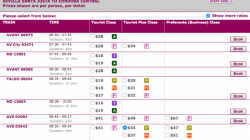Airline Reporting Corp. released a new survey on the best day to buy airline tickets, as reported in The Wall Street Journal yesterday. View from the Wing mentioned the survey on his blog this morning, but I have a different take that I’ll get to in a moment. The survey claims that weekends have become a cheaper day to buy. Historically people have argued in favor of Tuesday or Wednesday, after carriers announce their weekly sales. (I’m happy to provide a link to the article if you don’t have access, just email me at scott@travelcodex.com.)
Gary correctly points out that the report does not contain data on days when the lowest prices are offered. Rather, the report examines when the cheapest tickets were purchased. It’s plausible that the two are the same but hardly guaranteed.
Many of the speculations included in the WSJ article remain reasonable. For example, there’s little doubt that the increasing presence of computers at home has made it easier to buy tickets on weekends. If we want to assume that the report examines the cheapest day to buy, then this makes sense because airlines may be marketing more heavily to leisure travelers on weekends. If we want to assume that the report examines when the cheapest tickets were actually purchased, then it still makes sense because price-sensitive leisure travelers are more likely to make purchases on weekends regardless of when the cheapest tickets are actually for sale. The middle of the week remains dominated by business travelers with bigger pockets.
I think the conclusion you should draw from the limitations of these data is that it isn’t too important which specific day of the week you purchase your tickets. Instead, let’s get back to the original issue: You want to get a good deal on air travel. It turns out that the report actually does provide some useable guidance on when these low fares are available — just not at the resolution of a single day.
Don’t Miss the Forest for the Trees
In data provided by the report and plotted by WSJ, there are two figures for domestic and international tickets. The cheapest day to buy international tickets is placed at 171 days (24 weeks) before departure, and the cheapest day to buy domestic tickets is placed at 57 days (8 weeks) before departure. What’s more interesting is that the day-to-day variation around these points is almost negligible, somewhere around 5%.
Fares are slightly higher much farther in advance, and much higher if you go much closer to departure. We already know this. Very far before departure airlines have no good reason to discount (they expect the plane to be empty and aren’t in a hurry to sell seats), while very close to departure airlines have every incentive to raise prices (they expect most last-minute buyers to have essential travel needs and a willingness to pay whatever it takes).
But that window of minor variation is quite large. For international tickets, you could book about 171 days out +/- 50 days. That means you could book anywhere from 28 to 20 weeks before departure and still get a good price. For domestic tickets you could book about 57 days out +/- 25 days. That’s a range of 12 to 4 weeks before departure.
My Advice on Booking the Best Fare
This gets back to a point I slipped into another post this morning, about the value of searching for low prices but also finding a price you’re comfortable with and being happy. It’s very unusual that you will pay the absolute lowest price of any passenger on that plane. You have 100-300 competitors for that title, plus fares vary, and you can’t know for sure if they’re going to go up or down next week. They might even vary during the same week. But if you are willing to accept paying within 5% of that lowest price, then you don’t need to worry about the exact day you book.
Start looking 28 weeks out for international flights or 12 weeks out for domestic flights when these windows open. Get a sense of where they are and what competitors are offering in response. Watch fares change over the next week or two. By the time this mythical “lowest price day” appears, you will have a very good sense of what is a good deal and what isn’t — but my guess is fares will be very close to where they were when you started looking. You could book then, or you could wait a few more weeks betting that they’ll drop. But you’ll also know when your window starts to close and it’s time to bite the bullet.



